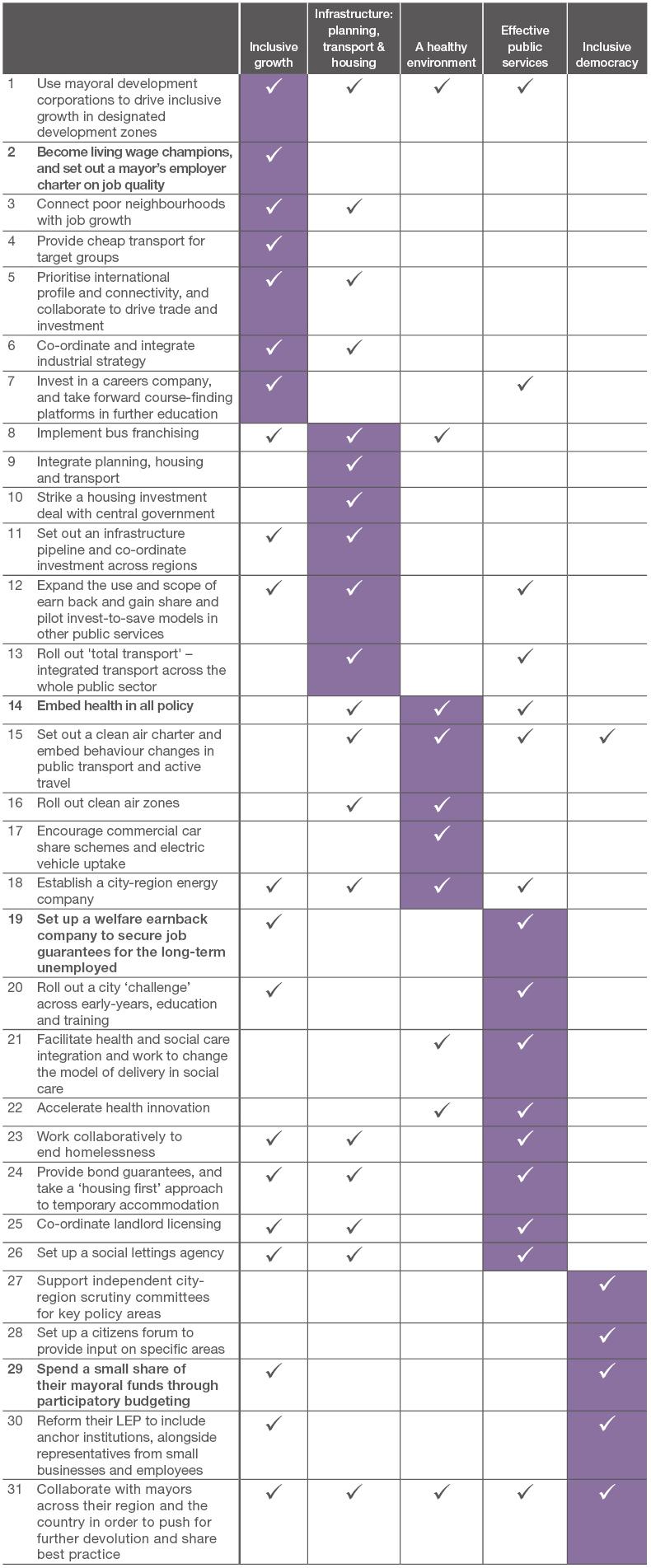England’s new leaders: How mayors can transform their cities
Article
60-second summary
England will soon welcome prominent and powerful city leaders. Six mayors will be elected to govern almost 10 million people and economies worth £214 billion – more than Scotland and Wales put together.
If the powers they hold are used effectively, these mayors could start to transform their city regions, but there has been little policy development for this purpose. This paper aims to fill the gap.
First, this paper sets out the three ‘enabling policies’ that mayors need to introduce: cutting across local and national silos to deliver against clear objectives, raising finance to invest, and gathering intelligence in order to enable innovation.
This paper then sets out a ‘menu’ of 30 things that these mayors could do to change their city regions for the better. These 30 policy ideas are set out across five broad outcomes, as described below.
Download the full evidence base for this paper (England's new leaders: Evidence base).
Mayors should deliver:
- inclusive growth – by using transport policy to prioritise poor neighbourhoods, using mayoral development corporations to provide quality jobs for local people, and championing the living wage and higher employment standards
- infrastructure, including planning, transport and housing – by integrating land use planning and working with central government to roll out financial innovations and housing investment
- a healthy environment – by embedding health in all public policy, introducing a clean air charter, and setting up an energy company
- effective public services – by setting up a new company to pilot ‘invest-to-save’ in employment support, collaborating with districts to end homelessness, and improving the quality of housing by investing in a social lettings agency and rolling out landlord licensing
- inclusive democracy – by empowering citizens and councillors to take part in collaborative governance, and enhancing local enterprise partnerships to include anchor institutions, and requiring new members to pay the living wage.
Finally, this paper sets out a range of things which government will need to do for the potential of mayors to be truly realised.
Recommendations to mayors
This report proposes 30 policies that mayors can roll out to transform their city regions (see the table below).
Five of these should be regarded as top priority.
- Become living wage champions, and set out a mayor’s employer charter on job quality (2).
- Set up a welfare earnback company to secure ‘job guarantees’ for the long-term unemployed (19).
- Implement bus franchising (8).
- Embed health in all policy (14).
- Spend a small share of their funds through participatory budgeting (29).
Finally, mayors should work together to drive further devolution, and by 2020 the government should strike a new series of devolution deals, prioritising fiscal devolution, and giving mayoral combined authorities across the country the powers to support their industrial strategy and public service reform.
Table A.1
Summary of this report’s recommendations and their outcomes; primary outcomes are highlighted in purple

Related items

From bystander to builder: government guidance will be essential for industry to thrive
Global political attention remains fixed on Washington. US president Donald Trump’s tariffs (and the circling threat of new tariffs) are challenging the global economic order and throwing governments into chaos. Intensifying economic…
Accountability matters: Securing the future of devolution
English local government faces major reshaping.
Nuclear enrichment: Building a stable and effective nuclear workforce
The government has talked a good game on the future of nuclear generation.